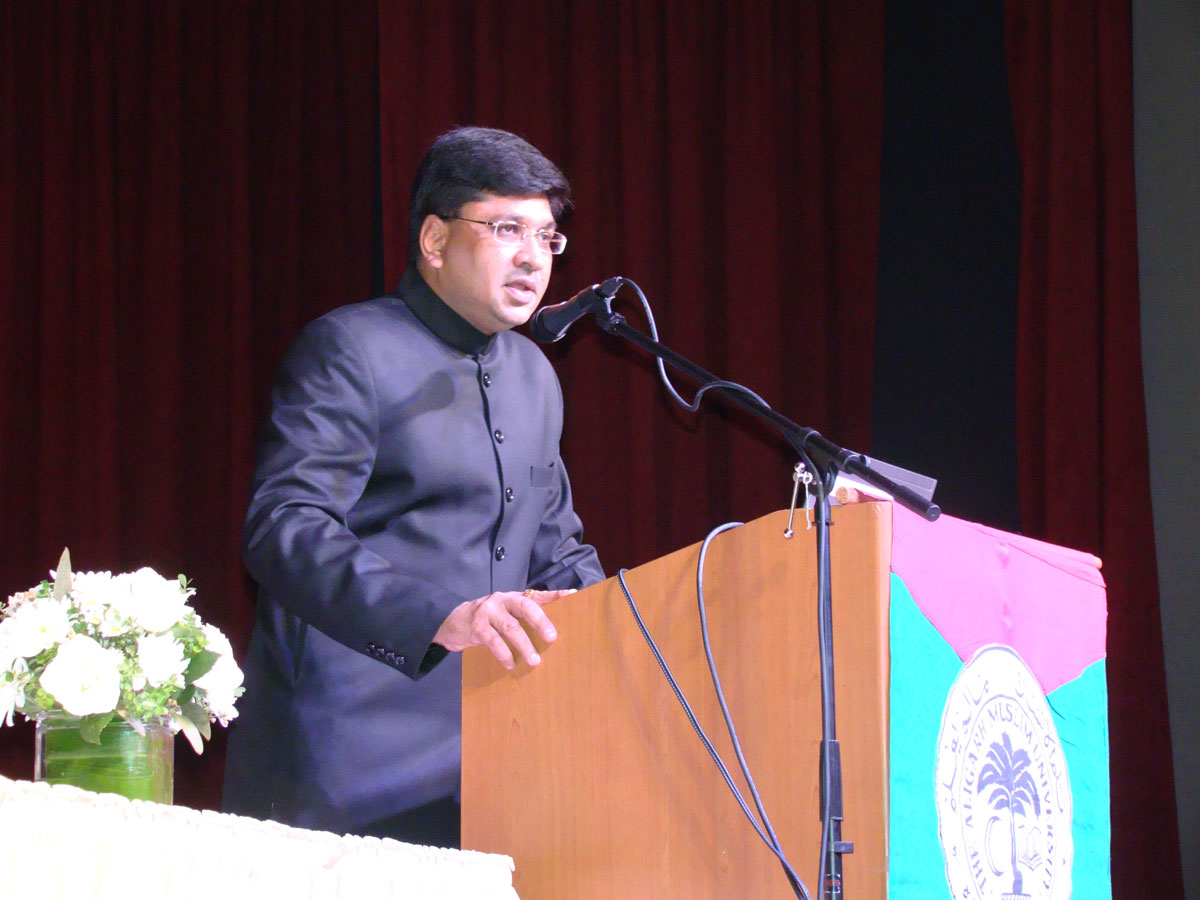SIR SYED DAY & AEEF DINNER IN SF BAY AREA
AMUAA President Nath
The Aligarh Muslim University Alumni Association of Northern California (AMUAA) held its 19th Sir Syed Day event at the ICC in Milpitas, Calif., Sept. 19, with a wonderful night of good food, charity and Urdu poetry, to honor and remember not only the founder of the esteemed university but also in a way to continue his mission, writes Ras Siddiqui.
Born on October 17, 1817 in Delhi, Syed Ahmad was bestowed with two titles, “Khan” from the Indian viewpoint and “Sir” from the British Empire. Today he is most commonly known as Sir Syed the educationist, modernizer, reformist and eventually leader of India’s once myopic Muslim community, which after the final defeat of the Mughal Dynasty in 1857 had gone into a rapid decline. And due to the determination that Sir Syed showed in setting up MAO College in 1875 (which later became AMU in 1920) people were lifted out of their slumber, and his imprint survives to this day as he is honored by doctors, engineers, scientists and technologists around the world, people who got the opportunity to enter their professions through the doors of Aligarh Muslim University.
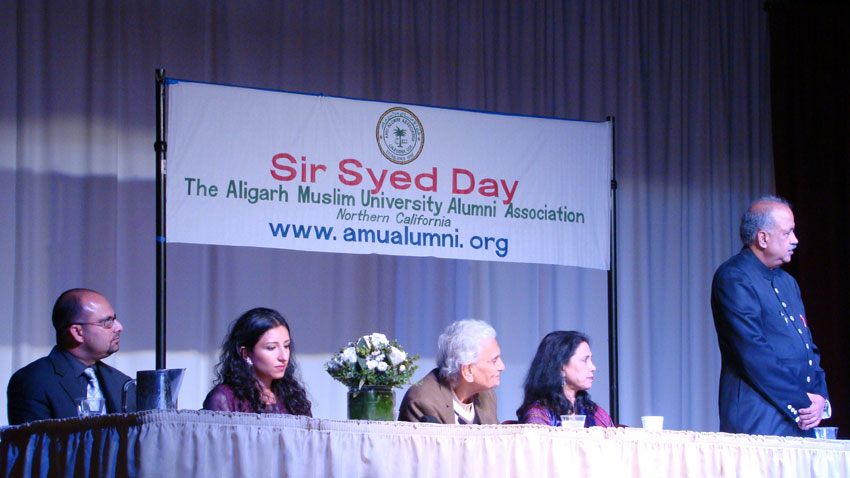
The intellect inspired by an AMU education or association to it is reflected in the annual bilingual (English-Urdu) publication of the Sir Syed Day Aligarh magazine, which was distributed at this event. As an indicator of the diversity of ideas presented in it, the obituary section alone is a trip through history and memory lane. It was also a delight to see that the Sir Syed Day Lifetime Achievement Award 2015 went to actor, director, producer, author and living legend, Zia Mohyeddin Sahib.
The evening started off with food in the Mughlai tradition and a long social segment. This annual gathering brings people from all over Northern California as Alumni bring their spouses or in some cases both husband and wife are Aligarians. In any case this is a meeting of friends and classmates too or for some (like this writer) for a time for a nostalgic look back to the generation of their parents. And non Aligarians/AMU well-wishers are always welcome and are drawn here by their love of Urdu and a wish to support education.
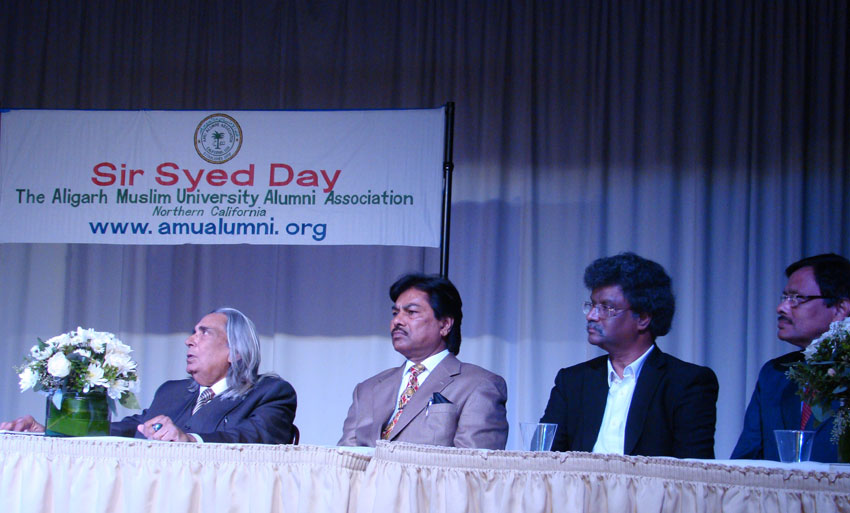
Black Sherwani attire is a signature of AMU and remained quite visible here. Sir Syed Day formalities here were once again conducted in two parts, the first focusing on AMU and Sir Syed along with a fundraiser for the Aligarh Education Endowment Fund (www.AEEF.us). The second part was once again the International Mushaira where Urdu poetry is recited by guest poets both locally and as far away as Canada, India and Pakistan.
The formalities began with the traditional recitation from the Holy Quran by M.A. Sarodi. This was followed by an introduction of the evening activities by AMU luminary Mrs. Amtul Suhail who also took the opportunity to thank all the event sponsors Kamil & Talat Hasan, Ashraf Habibullah, Syed Sarwat, Jamal Qureishi, Ms. Reshma Hyder & Mifam Team, Satish Dardal and Zaheed Kajani who made this grand evening possible.
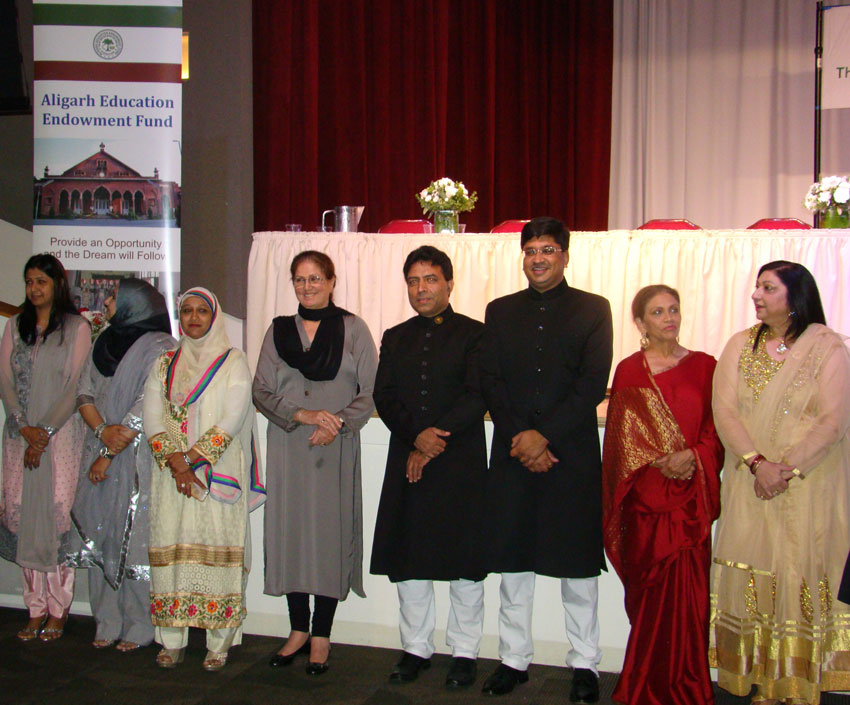
Dr. Shaheer Khan, a long-time AMU Alumni leader and activist, next elaborated on the Aligarh Education Endowment Fund (AEEF) with the help of a documentary, which helped to educate those who might have not been already familiar with the mission that this educational effort undertakes. He said that our generosity will be tested after we had the opportunity to view the video. To educate a child through the AEEF costs just $10/month and 100% of the funds raised here are spent directly on educating those in need. A breakdown of expenditures on various projects (Aligarh Modern School, Hamara School etc.) undertaken in the year 2014 and thus far in 2015 were detailed. Shaheer also mentioned that the annual budget for this effort was approximately $100,000 and that $50,000 had already been raised so the target for the evening was the remainder.
The goal was to provide education, vocational training, coaching, mentorship and the support of students at premier institutions of higher education. To help in the fundraiser Mrs. Shahla Khan came up to the stage and expressed her sentiments on the AEEF impact as she had recently visited Hamara School along with her husband Nihal Khan. She explained that she saw both hope and dedication in the eyes of the kids, which moved her and should move us as well.
In his official welcome AMUAA President Shachindra Nath thanked everyone. He said that Sir Syed had already given a powerful message on education. He stressed the importance of teachers in the educational mix and that we have all (luckily) been blessed with many good teachers in our lives. He added that besides students, he would also like to start a program for teachers who could also use our support and respect. Nath also expressed the hope that more AMU Alumni that live in the region would join the association. He also thanked all the volunteers for all the hard work that went into making this evening possible. Shachindra Sahib is always proud of his association with AMU and is a shining example of the pluralistic nature of the university.
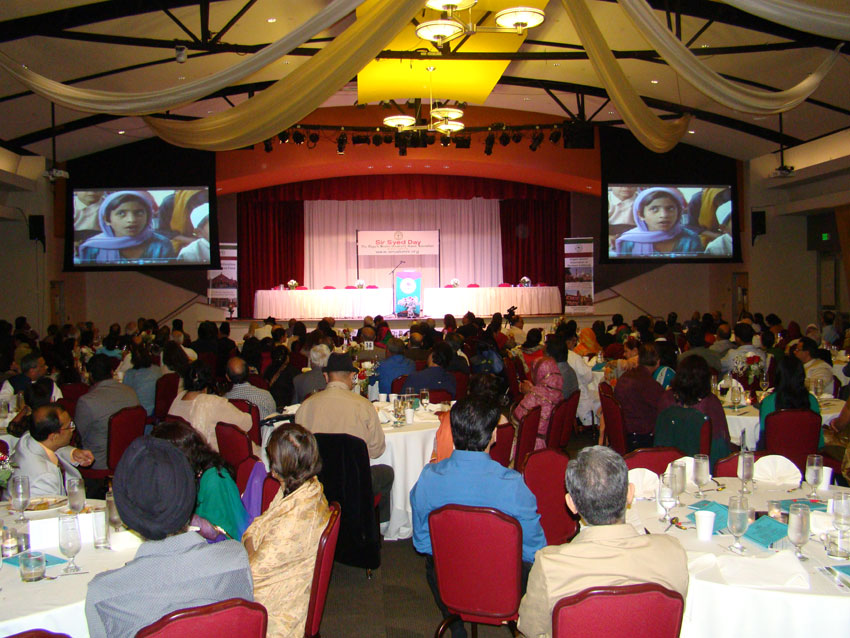
The keynote address of the evening was delivered by Aurangabad, India born and later Pakistani scholar, educator (mostly at the University of Karachi), linguist and leading Urdu poet, Professor Sahar Ansari. He has received two national awards from the government there and listening to him was quite a learning experience. He said that Sir Syed was a very important part of our history and that he was practical person, a “doer” or implementer of ideas and not only a thinker. His importance was such that he was often praised even by his usual critics. Amongst the many qualities that Sir Syed possessed, he highlighted his sense of humor (a must for dealing with the community). Ansari said that Sir Syed thought about the two ways that the Muslim community could emerge out of their servitude (Ghulami) of India’s new British rulers: 1) On the battlefield which was just not possible anymore or 2) To learn from them and acquire their knowledge to become competitive in the modern world. Sir Syed chose the second path and the light that he spread amongst India’s Muslims is still benefiting us said Ansari. The Professor stressed that Sir Syed was a man of a secular disposition and took the universalist-humanitarian approach as opposed to any narrow religious or sectarian path to doing his best for his people.
Central to that approach was the setting up of the educational institution, which later became Aligarh Muslim University, whose anthem or Tarana-e-Aligarh was played and sung by many Alumni here to close the first part of the formal program.
After a short break, the much-anticipated Urdu poetry or International Mushaira segment of the night began to the delight of the audience. The Nizamat or segment emcee task was carried out by Perwaiz Jafri (from Houston) and the Sadarat or Presiding role was reserved for our keynote speaker, Sahar Ansari. The lineup of poets this evening included local Bay Area wordsmiths Aifra Ahmed, Ahmar Shehwaar and Hamid Narvi, as well as Ishrat Afreen (Houston), plus Rajesh Reddy, Sunil Kumar “Tang” and Tahir Faraz from India. And what a night it certainly turned out to be.
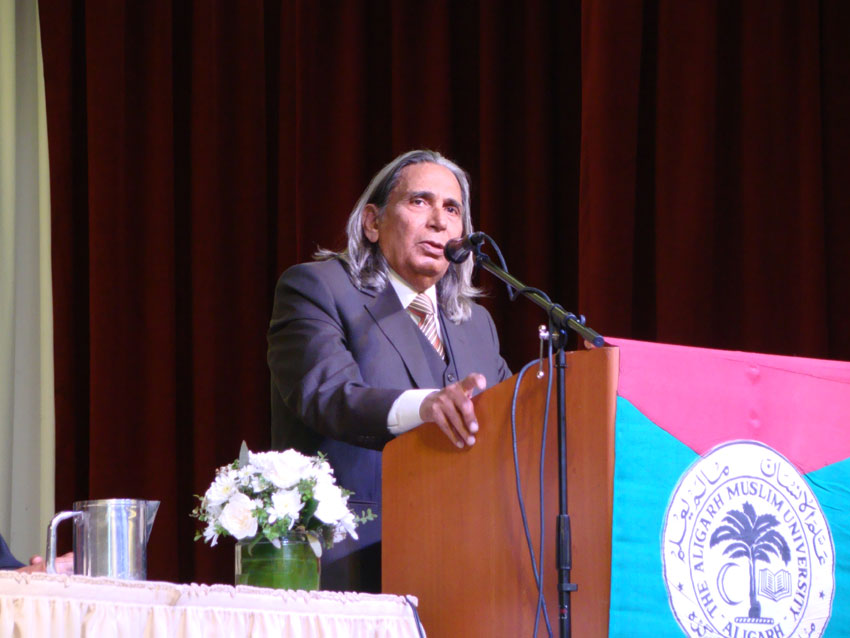
Each and every one of these Urdu language poets was a worthy presenter. Perwaiz and his “Ahista Ahista” and Aifra Ahmed’s “Jugnu” were a great introduction. Ahamar Shehwaar’s “Mausam” and “Dar Jaatey Hain” continued on with the contemplative after which Hamid Narvi and his “Pardey” and “Damisq Me Ishq” built up the momentum which culminated with Ishrat Afreen and her “Gum ho Jaana” and “Facebook Aur Mein” and another poem which we will revisit below that blew our minds as did Rajesh Reddy who turned out to be a spellbinder with his “Kiyun Nahin” and “Guzar Giya” and “Baqi Hai” and much more. But we had to be brought back to a comic reality by Sunil Kumar “Tang” who lived up to his reputation and generated a great deal of audience laughter which included topics such as rebuilt “Ghutnas” and shoes thrown at “Siyasat Daans” and Chappals at “Ashiqs”. Tahir Faraz next stole some of the spotlight with his delivery in Tarannum as he transcended borders with “Likhun” and “Dekh Liya” plus his very famous “Maai.” And Sahar Ansari closed on a rather philosophical note with “Mein Nahin Aaya” and “Kaisay Aa Giya” and a poetic “selfie,” a post open heart surgery poem that he had carefully crafted.
To conclude, let us move Sir Syed’s message to current times. One finds that the situation of parts of the worldwide Muslim community is not unlike their decline in India after 1857 and that the second option that Sir Syed chose is the only way forward. What prompted this reflection here were the lines from the poem “Laal Kamiz” by Ishrat Afreen presented here which expressed her feelings with hair raising accuracy on seeing a photograph of a dead refugee child by the name of Aylan Kurdi face down on seashore wearing a red shirt (Laal Kamiz).
